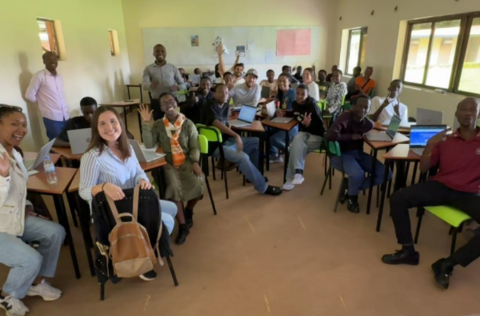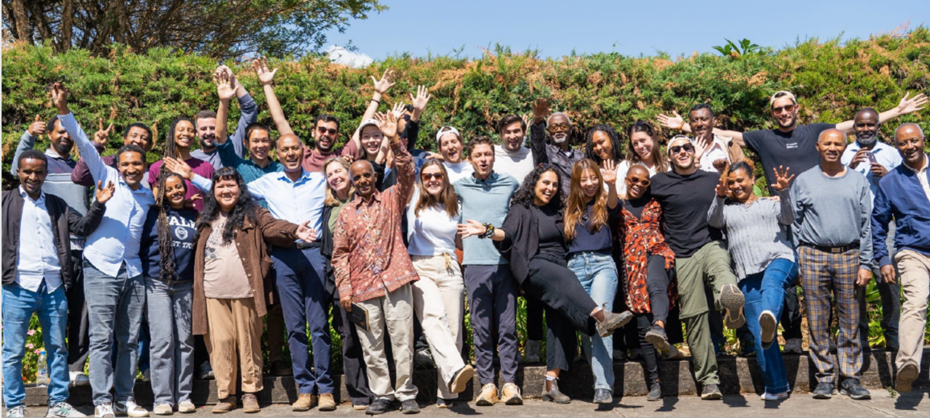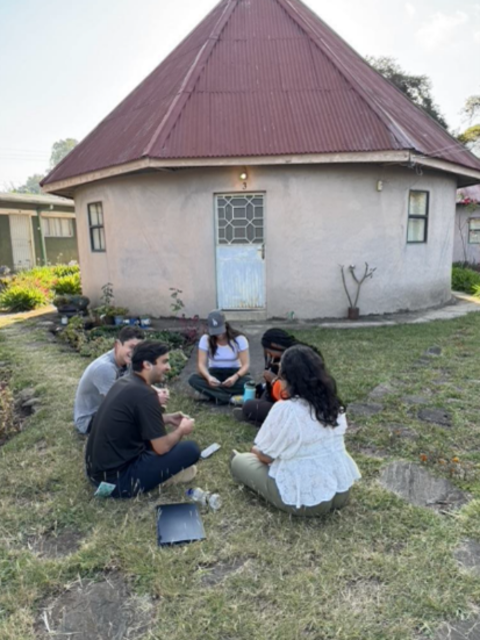Students Visit Rwanda and Ethiopia and Create Positive Social Impact and Real Value for Their Two Nonprofit Clients for Their Capstone Focused on Global Social Impact Consulting in East Africa

Capstone projects continue to evolve at UCLA Anderson. With the new strategic plan as a guide, FTMBA students have a new set of five faculty-developed options available for their final projects. Up to 25 students enroll in focused seminars led by specially chosen faculty who are experts in the subject matter and design a capstone project based on their own areas of interest. Among the many capstone options tailored to UCLA Anderson students’ career interests is one with a focus on global social impact consulting (GSIC).
Launched in 2023–24, the GSIC capstone course is taught by Gayle Northrop (’96), adjunct professor of social entrepreneurship and senior faculty advisor for Anderson’s Center for Impact, who teaches the CGM’s global immersion course focused on social entrepreneurship and innovation in South Africa. The capstone course introduces students to the challenges, opportunities and inspiration associated with creating positive social impact in a global context, focusing on nongovernmental organizations (NGOs) in East Africa. It is a new approach to introducing students to social impact in a unique global context while allowing them to gain consulting skills in real time with client organizations in East Africa and immersing them in the local culture and context.
The GSIC capstone curriculum integrates concepts related to consulting, social impact and international development, and requires students to draw on learnings from core courses in strategy, marketing and leadership foundations. They also draw from their experiences in elective courses such as social entrepreneurship; leadership; diversity, equity and inclusion; and sustainability. During the capstone, students put into practice the MBA experience they’ve acquired conducting research, analyzing data, communicating effectively, synthesizing complex ideas, and preparing coherent, compelling presentations and client-facing deliverables. The experience the students gain through the course can be applied in a variety of future career paths and opportunities, including consulting, international business, project management, social entrepreneurship, and any role requiring strategic analysis, collaboration and teamwork, cultural sensitivity and humility, contextual awareness and perseverance.
In the second capstone course, UCLA Anderson partnered with two NGOs in East Africa, both with a shared interest in localization, scaling deep and changing the paradigm around the types of organizations and models that funders and the broader impact community value and invest in. The 20 students enrolled in the course were organized into four teams, each with its own consulting project and scope of work and all focused on deepening and widening impact opportunities for integrated, holistic, community-led NGOs in East Africa.
Students worked with Rwanda-based Agahozo Shalom Youth Village (ASYV), whose mission is to empower orphaned and vulnerable youth to build lives of dignity and contribute to a better world, and Ethiopia-based Project Mercy, whose mission is to improve life in rural Ethiopia by eliminating poverty through improved education, health, nutrition, infrastructure and economic empowerment. In December, Professor Northrop accompanied the 20 FTMBA students as they deepened their research and met with their client organizations just outside of Kigali, Rwanda, and in Yetebon, Ethiopia. The CGM supported the in-country travel and logistics portion of the capstone.
While in-country, students worked closely with clients and conducted primary research for their interrelated yet distinct projects. For ASYV, the work focused on two main areas. One project centered on scale and sustainability, supporting ASYV in developing a feasibility study and rollout plan to expand its holistic model to other regions of Rwanda and neighboring countries. The second project involved developing a new curriculum that could be offered to ASYV’s high school-age students, empowering them with entrepreneurial skills, a business plan toolkit and other resources to support their entrepreneurial journeys.
For Project Mercy, students also pursued two complementary initiatives. One team developed an impact measurement model that could assess the effectiveness and efficiency of Project Mercy’s Integrated Holistic Community-led Development (IHCD) approach, resulting in an innovative framework called a “Dollar Map.” The other team focused on curriculum development, creating a framework and a variety of customized educational materials that can be used by Ethiopian university master’s degree programs to teach the IHCD approach.
Lessons from the inaugural year of the capstone course that were applied in 2024–25 included acknowledging the value of working with multiple organizations and visiting multiple countries, the importance of client engagement and the clients’ commitment to the students’ learning journey, the value of in-depth pre-travel research and context setting, and recognizing that deep listening and curiosity during travel helps ensure student teams deliver real and sustainable value to their clients.
Four teams of FTMBA students have been selected to participate in the 2025–26 course, which will include travel to Kigali, Rwanda, and Yetebon, Ethiopia, for projects with the same two clients. New interrelated yet differentiated projects have been identified for the teams, and the 20 students enrolled in the course are preparing for early morning client meetings during the fall quarter and are eager to participate in the third iteration of the capstone, which will continue to provide tangible value and impact to their partner organizations in East Africa. The CGM looks forward to continuing its support of the GSIC capstone course.








